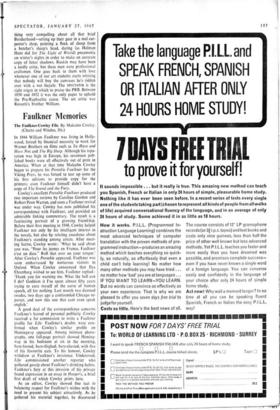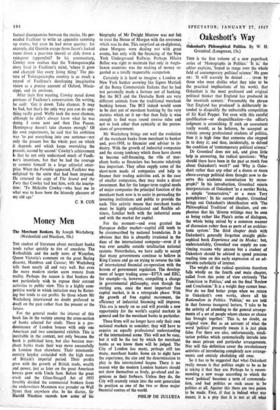Faulkner Memories IN 1944 William Faulkner was living in Holly-
wood, forced by financial necessity to work for Warner Brothers on films such as To Have and Have Not and The Big Sleep. Although his repu- tation was high in Europe, his seventeen pub- lished books were all effectively out of print in America. When at that time Malcolm Cowley began to prepare his Portable Faulkner for the Viking Press, he was forced to tear up some of his first editions to provide copy for the printers; even Faulkner himself didn't have a copy of The Sound and the Fury.
Cowley's excellent Portable Faulkner produced two important reviews by Caroline Gordon and Robert Penn Warren, and soon a Faulkner revival was under way. Cowley has now published his correspondence with Faulkner, and provided an admirable linking commentary. The result is a fascinating portrait of a growing friendship. Before their first meeting in 1948, Cowley helped Faulkner not only by his intelligent interest in the novels, but also by relating anecdotes about Faulkner's standing among artists. After meet- ing Sartre, Cowley wrote: 'What he said about you was, "Pour les jeunes en France, Faulkner c'est un dieu." Roll that over on your tongue.' After Cowley's Portable appeared, Faulkner was soon embarrassed by numerous visitors to Oxford. When Cowley announced that Ilya Ehrenburg wished to see him, Faulkner replied : 'Thank you for warning me. What the hell can I do? Goddam it I've spent almost fifty years trying to cure myself of the curse of human speech, all for nothing. Last month two damned swedes, two days ago a confounded Chicago re- porter, and now this one that cant even speak english.'
A good deal of the correspondence concerns Faulkner's hatred of personal publicity. Cowley received a fat commission to write a Faulkner profile for Life. Faulkner's doubts were con- firmed when Cowley's similar profile on Hemingway appeared. Among intimate photo- graphs, one full-page portrait showed Heming- way in his bedroom at six in the morning, bare-footed, bare-thighed, bare-chested, with five of his favourite cats. To his honour, Cowley withdrew at Faulkner's insistence. Undeterred, Life commissioned another reporter who gathered gossip about Faulkner's drinking habits. Faulkner's fury at this invasion of his privacy found expression in an essay in Harper's, a brief first draft of which Cowley prints here.
As an editor, Cowley showed fine tact in balancing respect for Faulkner's wishes with the need to present his subject attractively. As he gathered his material together, he discovered
factual discrepancies between the stories. He per- suaded Faulkner to write an appendix summing up events, but soon he had more queries: for example, did Quentin escape from Jason's locked room down a pear-tree (novel) or slide down a rainspout (appendix)? In his commentary, Cowley now realises that the Yoknapatawpha story lived in Faulkner's mind, 'where it grew and changed like every living thing.' The pic- ture of Yoknapatawpha country is as much a record of Faulkner's developing imaginative vision as a precise account of Oxford, Missis- sippi, and its environs.
After their first meeting, Cowley noted down portions of Faulkner's conversation. On writing, he said: 'Get it down. Take chances. It may be bad, but that's the only way you can do any- thing really good. Wolfe took the most chances, although he didn't always know what he was doing. I come next and then Dos Passos. Hemingway doesn't take chances enough.' Of his own experiments, he said that his ambition was `to put everything into one sentence—not only the present but the whole past on which it depends and which keeps overtaking the present, second by second.' Cowley's achievement h that he not only understood much of Faulk- ner's intentions, but that he had the courage to commit himself in a large editorial enter- prise. When the Portable appeared, Faulkner was delighted by the unity that had been imposed. He returned the copy of The Sound and the Fury that Cowley had lent him, with the inscrip- tion : Malcolm Cowley—who beat me to what was to have been the leisurely pleasure of my old age.'
C. B. COX



































 Previous page
Previous page